As dedicated pet parents, we all want to ensure our furry companions lead happy, healthy lives. A crucial aspect of canine care is understanding their diet, particularly which human foods are off-limits. While it’s tempting to share a bite from your plate, many common household foods can be your dog’s worst enemy, with some being toxic even in small amounts. Canine digestion and metabolism differ significantly from ours, meaning substances we safely consume can be highly dangerous for our pets. This guide aims to be your essential “cheat sheet” for what dogs can’t eat, helping you navigate the complexities of their diet and avoid potential pet poisonings. For a positive contrast, if you’re curious about what foods are ok for dogs to eat, exploring safe alternatives can be just as important as knowing what to avoid.
Understanding these dietary distinctions is vital. For instance, dogs process theobromine and caffeine in chocolate much slower than humans, allowing these substances to build up rapidly and potentially become fatal. Similarly, while the fleshy parts of some fruits are safe, the pits, stems, and leaves can harbor toxins like cyanide. Food toxicity can also vary based on a dog’s size, breed, and existing health conditions, making it paramount to consult your veterinarian with any dietary concerns.
Why Certain Foods Are Toxic to Dogs
Canine digestion and metabolism function distinctly from human systems, which explains why many foods safe for us are harmful to dogs. Their bodies process certain substances very differently, often leading to toxic accumulation or adverse reactions. For example, the slower metabolism of theobromine and caffeine in chocolate means these compounds can quickly reach dangerous levels in a dog’s system. Similarly, while cherries are a harmless treat for humans, the cyanide in their pits, stems, and leaves can pose a risk in large quantities, in addition to the pits causing potential digestive upset like diarrhea.
Furthermore, the impact of food toxicity can fluctuate depending on various factors, including the dog’s size, specific breed, and overall health status. Smaller dogs, for instance, are generally more vulnerable to toxins due to their lower body weight. Puppies and elderly dogs, with their less developed or potentially compromised digestive and immune systems, may also face higher risks. These individual differences underscore the importance of veterinary consultation when questions arise about any food your dog might ingest.
List of Common Foods Dogs Cannot Eat
Many everyday household foods are dangerous, and often toxic, to dogs. The following comprehensive list details common items that should always be kept out of your dog’s reach. While this guide covers a significant number of hazards, remember it’s not an exhaustive list.
1. Alcohol
Even minuscule amounts of alcohol can have devastating effects on dogs and cats due to their smaller size compared to humans. Symptoms of alcohol poisoning in dogs mirror those in people, including vomiting, breathing difficulties, coma, and even death. The smaller your pet, the more critical even a small sip can be.
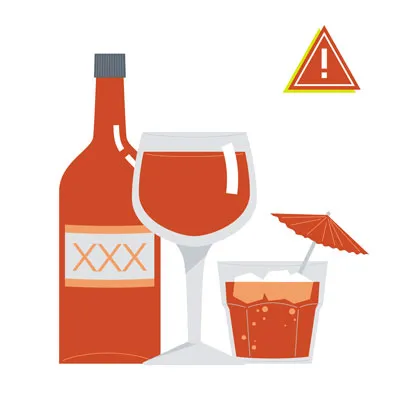 A dog sitting next to an overturned glass of red wine, looking concerned
A dog sitting next to an overturned glass of red wine, looking concerned
2. Apple, Apricot, Cherry, and Plum Seeds/Pits
While the fleshy part of an apple is safe for dogs, the core and especially the seeds are not. Apple seeds contain cyanide, and though small amounts might be tolerated, it’s always best to remove the core and seeds entirely. Similarly, the pits from apricots, cherries, peaches, and plums must be avoided. These fruit pits also contain cyanide, a substance that can impair red blood cells’ ability to carry oxygen, leading to severe symptoms like vomiting, irregular heartbeats, seizures, coma, and potentially death.
3. Avocado
Avocados are not a suitable food choice for dogs. While the exact toxic mechanism in dogs is debated, there are documented cases of myocardial damage in dogs linked to avocado consumption in other species. More importantly, an intact avocado pit poses a significant choking hazard and can cause a dangerous gastrointestinal obstruction if swallowed. Therefore, it’s safest to keep this fruit away from your canine companion.
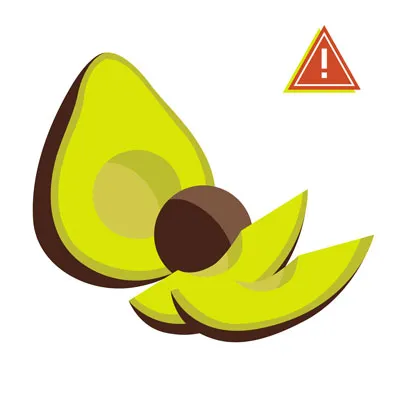 A dog looking at a sliced avocado on a wooden board
A dog looking at a sliced avocado on a wooden board
4. Broccoli
Broccoli contains isothiocyanates, which, in very large doses, can be harmful to pets. While tiny amounts of broccoli might be acceptable occasionally, it’s generally advisable to avoid it, especially given the abundance of other healthy and safe vegetable options available for dogs. Additionally, broccoli stalks can sometimes become lodged in a dog’s throat, leading to an obstruction.
5. Caffeine and Coffee Grounds
Caffeine is a potent stimulant that contains methylxanthines, compounds that can cause potentially fatal symptoms in dogs. Ingestion of caffeine can lead to vomiting, diarrhea, seizures, and an irregular heartbeat. Even accidental consumption of coffee grounds or highly caffeinated drinks can cause a dog’s heart to race, resulting in tremors, arrhythmia, and difficulty breathing.
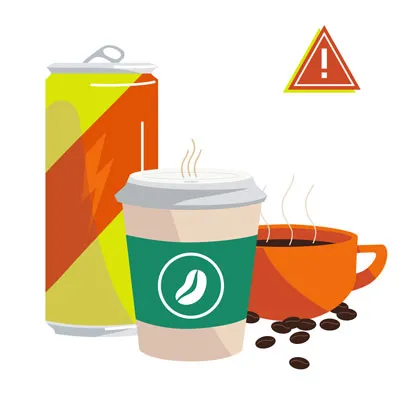 Coffee beans and grounds next to a dog's bowl
Coffee beans and grounds next to a dog's bowl
6. Chicken & Turkey Skin, Ham, and Other Fatty Cuts of Meat
Feeding dogs fatty cuts of meat, such as chicken or turkey skin and ham, is highly discouraged. These items are detrimental due to their high fat content, which can trigger acute pancreatitis—a life-threatening illness with severe complications. Rather than offering these as treats, it’s safer to dispose of them. Furthermore, always avoid giving turkey and chicken bones, as they can splinter and cause internal damage, obstructions, or even puncture the stomach or intestines, leading to fatal abdominal infections. While these meats are unsafe, for healthier alternatives, consider learning what is the best meat for dogs to eat.
7. Chocolate
Chocolate toxicity is a frequent cause of pet poisoning, especially during holidays. Dogs absolutely cannot eat any chocolate product. Chocolate contains theobromine, a lethal compound, with darker chocolates having higher concentrations. It also contains caffeine, and some sugar-free variations might even include xylitol, which is also highly toxic to dogs. Dogs and cats cannot metabolize chocolate effectively, making any type problematic, though dark and baker’s chocolate are the most dangerous. Symptoms range from hyperactivity, vomiting, diarrhea, and pancreatitis to abnormal heart rhythms and seizures. Immediate veterinary attention is crucial if your dog ingests any amount of chocolate. This is a prime example of what are foods dogs cant have.
 A piece of dark chocolate on a table near a dog
A piece of dark chocolate on a table near a dog
8. Grapes and Raisins
Grapes and raisins pose a severe threat to dogs, as they can lead to acute kidney failure. The tartaric acid present in these fruits is highly toxic to a dog’s kidneys, and even a small amount can wreak havoc on their system. Symptoms of grape or raisin poisoning include vomiting, diarrhea, loss of appetite, and changes in urine output, potentially progressing to complete anuria (no urine production). For more on toxic fruits, consult resources on what fruits can your dog not eat.
 A bunch of green grapes in a bowl
A bunch of green grapes in a bowl
9. Macadamia Nuts, Almonds, and Pistachios
Macadamia nuts are particularly dangerous for dogs, causing painful symptoms such as weakness, overheating, and vomiting. The precise mechanism of their toxicity remains somewhat mysterious, but even as few as six nuts can induce severe poisoning in a small dog. While other nuts like almonds and pistachios are not as acutely toxic as macadamia nuts, they can still present choking hazards or become problematic if they are flavored or spiced. It’s best to avoid feeding any nuts to your dog.
10. Milk and Dairy Products
The suitability of milk and other dairy products for dogs varies. Some dogs can tolerate dairy without issue, while others are lactose intolerant or have allergies, leading to symptoms like diarrhea and gas from cow’s milk. Ice cream is generally bad for dogs due to its high sugar and fat content. As a healthier alternative, consider freezing small pieces of safe fruits. Cheese, in small quantities, can be acceptable, but opt for lower-fat varieties as a treat.
11. Mushrooms
It is advisable to always err on the side of caution and prevent your dog from eating any mushrooms. Wild mushrooms, in particular, contain a variety of toxins that can lead to severe health issues, including kidney and liver failure, vomiting, diarrhea, hallucinations, and damage to red blood cells. While washed white mushrooms from a grocery store might seem innocuous, it’s generally safer to choose alternative treats to avoid any risk.
12. Nutmeg and Cinnamon
Dogs should never be fed foods containing nutmeg. This spice contains myristicin, a compound that can cause severe vomiting and hallucinations, especially in high doses or when consumed by smaller dogs. If your dog ingests any amount of nutmeg, contact your veterinarian immediately. Cinnamon, while not strictly toxic, can irritate a dog’s mouth and, in some cases, lead to a dangerous drop in blood sugar, posing serious health risks.
13. Onions, Garlic, Chives, and Leeks
Many pet owners are unaware that herbs from the allium family—including onions, garlic, chives, and leeks—are highly unsafe for dogs. These plants contain sulfoxides and disulfides that can damage red blood cells, leading to potentially fatal anemia in both dogs and cats. It’s crucial to check labels of prepared foods, even baby food, as onion and garlic powders are common hidden ingredients. Certain Japanese breeds, such as Akitas and Shiba Inus, are particularly sensitive to allium plants, but they pose a danger to all dogs.
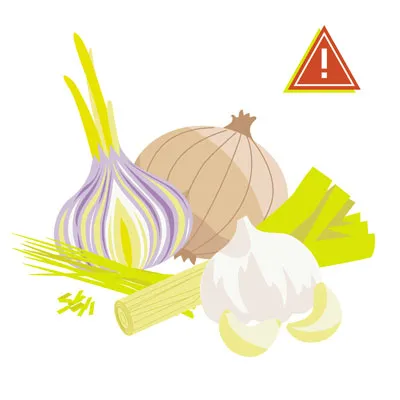 A pile of onions, garlic cloves, and chives on a cutting board
A pile of onions, garlic cloves, and chives on a cutting board
14. Salt
Excessive salt intake can disrupt the fluid balance in a dog’s cells, leading to dangerous symptoms such as tremors, seizures, diarrhea, or even a coma. Whether it’s rock salt, homemade play dough, or salty potato chips, resist those pleading eyes and never let your dog consume high amounts of salt, as it can severely jeopardize their health.
15. Spicy Food
Keep your dog far away from spicy foods. Hot and spicy ingredients can cause uncomfortable and painful reactions for your pup, including vomiting, stomach ulcers, and diarrhea. Such incidents can not only distress your dog but also lead to costly emergency veterinary visits.
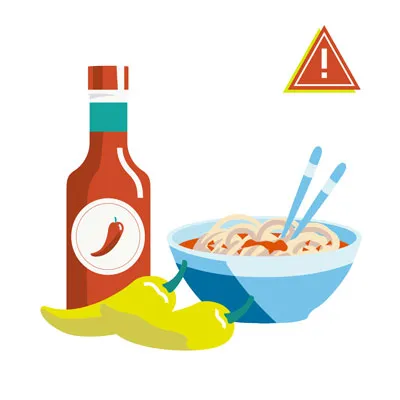 A small dog looking curiously at a plate of spicy peppers
A small dog looking curiously at a plate of spicy peppers
16. Sugar-Free Gum and Candy (Xylitol)
Xylitol is an artificial sweetener found in many human foods, including sugar-free gum, candy, and some baked goods. In dogs, even a small amount can cause a rapid and dangerous drop in blood sugar, leading to weakness and seizures. Some dogs may also develop liver failure. Cases of xylitol poisoning are on the rise; as little as five pieces of gum containing xylitol have the potential to be fatal for a 65-pound dog.
17. Tomatoes and Raw Potatoes
Tomatoes and potatoes fall into a category of foods that are safe in some forms but dangerous in others. A ripened red tomato is generally acceptable for dogs. However, the green parts of the tomato plant and green, unripe tomatoes contain solanine, which is toxic to dogs. The same applies to potatoes: baked or boiled potatoes without additives are usually safe in small amounts, but raw potatoes also contain solanine and are toxic.
 A dog looking at a selection of fresh tomatoes and raw potatoes
A dog looking at a selection of fresh tomatoes and raw potatoes
18. Tobacco
Tobacco and nicotine-containing products are extremely dangerous and unhealthy for your dog. Exposure can lead to a variety of severe symptoms, including vomiting, diarrhea, rapid or labored breathing, agitation, abnormal heart rate, wobbliness, muscle weakness, fluctuations in blood pressure, seizures, and tremors. More frequent or significant exposure can result in blue gums, coma, and ultimately be fatal. Dogs are naturally curious and might ingest cigarette butts left on the sidewalk or in an ashtray, necessitating immediate veterinary attention if exposure occurs.
19. Yeast and Raw Dough
Yeast and raw dough are unsafe for dogs for multiple reasons. Raw dough can expand significantly in a dog’s stomach, causing severe pain and potentially life-threatening conditions like gastric torsion or stomach rupture. Additionally, the yeast and sugar in raw dough can ferment, producing alcohol, which can lead to alcohol toxicity. This rapidly progressing condition requires immediate medical intervention to prevent fatal outcomes.
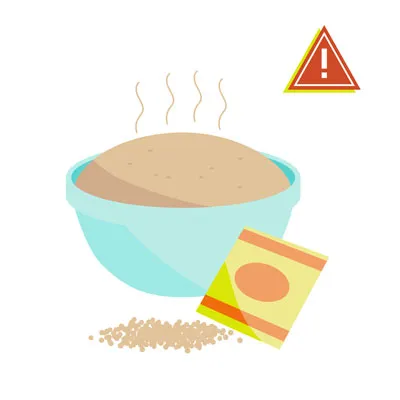 A bowl of raw dough rising on a counter
A bowl of raw dough rising on a counter
20. Raw Meat
Never feed your dog raw or undercooked meat. Raw meat can harbor harmful bacteria like Salmonella or E. coli, which can be detrimental to dogs just as they are to humans. Furthermore, bones found in raw meat pose a significant choking hazard and can cause internal injuries if ingested.
21. Rhubarb
Rhubarb, commonly used in human desserts, is not safe for pets. Its leaves contain soluble calcium oxalate crystals. If consumed in sufficiently large quantities, these crystals can bind with calcium in the dog’s body, causing a dangerous drop in calcium levels and potentially leading to renal (kidney) failure. Symptoms include tremors, weakness, drooling, bloody urine, changes in thirst and urination, and vomiting.
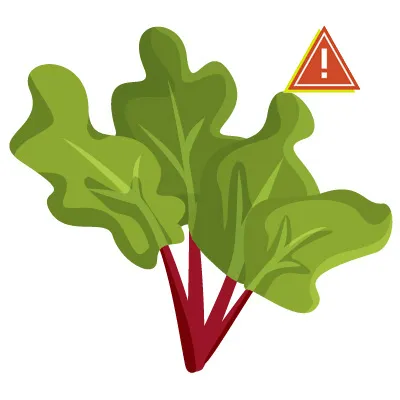 Fresh rhubarb stalks on a wooden table
Fresh rhubarb stalks on a wooden table
22. Star Fruit
Similar to rhubarb, star fruit also contains soluble calcium oxalate crystals. Therefore, it is best to prevent your dog from snacking on this fruit to avoid potential health risks.
23. Flavored Water and Seltzer Water
When it comes to your dog’s hydration, always opt for fresh, clean plain water over anything flavored or carbonated. Flavored and seltzer waters can contain added ingredients that are harmful to pups, such as sugars or salts. While plain seltzer water might be acceptable in small, urgent amounts, it could lead to gas and bloating. Sticking to plain water is always the safest and healthiest choice for your dog.
What Dogs Are Most at Risk if They Consume Toxic Foods?
While all dogs should be protected from toxic foods, certain factors can increase a dog’s risk level if they accidentally ingest something harmful:
- Small Breeds vs. Large Breeds: Smaller dogs are generally more vulnerable to toxins due to their lower body weight. For substances like chocolate, a smaller dog will experience a higher concentration of the toxin per pound, leading to more severe effects.
- Puppies: Young dogs have developing digestive and immune systems, which makes them more susceptible to certain substances. Their curiosity and indiscriminate eating habits also put them at higher risk.
- Elderly Dogs: Older dogs may have pre-existing health conditions or compromised organ function, which can increase their risk from toxic foods. Their bodies might be less efficient at metabolizing and eliminating toxins.
- Dogs with Pre-existing Conditions: Dogs with underlying health issues such as diabetes, kidney disease, or liver problems are at a significantly higher risk. These conditions can impair their body’s ability to process and eliminate toxins, leading to more severe and life-threatening reactions.
How to Prevent Dogs from Eating Toxic Foods
Accidents can happen, but proactive measures can significantly minimize the risk of your beloved pup ingesting unsafe human food.
1. Store Foods Out of Reach
The most effective prevention strategy is to ensure your dog cannot access any toxic food. Store dangerous items on high shelves that are well beyond your dog’s reach, or lock them away in cabinets that your pup cannot open. This vigilance is especially important for items commonly left on counters or low tables.
2. Avoid Feeding Dogs from Your Plate
Resist the urge to feed your dog scraps from your plate or give them treats while you are cooking in the kitchen. This practice can encourage begging and confuse your dog about which foods are acceptable. It is safest to only offer treats that are specifically formulated and approved for dogs.
3. Educate Family Members and Guests
Ensure all family members, including children, and any guests are aware of the dangers of feeding human food to your dog. Emphasize that no matter how appealing or tempting it may be, they should never sneak any food to your canine companion without your explicit approval. Clear communication can prevent many accidental ingestions.
4. Be Careful During Holidays
Exercise extra caution during holidays and special occasions. The bustling activity, abundance of food, and potential distractions can make it easy to lower your guard, increasing the risk of your dog getting into something dangerous. Plan ahead to keep hazardous foods secured. If your precautions fail and your dog eats something toxic, be prepared to act quickly. Keep emergency contact information readily accessible for 24/7 veterinary services and pet poison control hotlines.
What to Do if Your Dog Eats Something Toxic
If you suspect your dog has ingested toxic food, prompt action is critical.
Familiarize yourself with the common symptoms of food toxicity so you can quickly recognize when your dog might be in distress. These symptoms can vary widely depending on the ingested substance but often include listlessness, general distress, pain, vomiting, and bloody stools. In some cases, a dog’s abdomen may become bloated and hard to the touch due to gas, a painful condition that can lead to a stomach rupture if not treated immediately.
If you observe any of these symptoms or suspect toxicity, follow these steps:
- Contact Your Veterinarian or Poison Control Immediately: Time is of the essence. Treatments are generally more effective, and hospitalization periods shorter, when a dog receives prompt medical attention.
- Gather Essential Information: Be prepared to provide details such as the type of food eaten, the estimated amount consumed, and the time of ingestion. This information is crucial for your vet to determine the best course of action.
- Avoid Home Remedies Unless Advised: Do not attempt any home remedies, such as inducing vomiting, unless specifically instructed by your veterinarian or a poison control expert. Certain substances can cause more harm if vomiting is induced, and treatments vary depending on the specific toxin.
Keeping Your Canine Companion Safe
It can be challenging to keep track of all the foods and household items that are dangerous for your dog. Our canine companions, with their curious natures, don’t always have the most discerning taste. However, by adhering to this comprehensive guide on what dogs can’t eat and maintaining vigilance, you can significantly safeguard your dog from harmful foods.
The good news is that there are many safe and healthy foods your dog can enjoy! Explore our other resources, such as what are things that dogs can eat, to discover tasty and approved treats for your good boy or girl. Always consult your veterinarian if you have any doubts about a particular food item.
Sources/Citations
- “Top 10 dog poisons,” Hilary Parker (5/2023), WebMD, https://www.webmd.com/pets/dogs/top-10-dog-poisons
- “What happens if a dog eats chocolate?” (10/2023), Colorado State University, https://vetmedbiosci.colostate.edu/vth/animal-health/why-is-chocolate-bad-for-dogs/
- “Fruits and vegetables dogs can or can’t eat,” (3/2024), American Kennel Club, https://www.akc.org/expert-advice/nutrition/fruits-vegetables-dogs-can-and-cant-eat/
- “What to do if your dog drinks alcohol,” Jerry Klein (7/2023), American Kennel Club, https://www.akc.org/expert-advice/vets-corner/is-alcohol-dangerous-for-dogs/
- “Can dogs eat apples?” Hector Joy (12/2022), PetMD, https://www.petmd.com/dog/general-health/can-dogs-eat-apples
- “Can dogs eat plums?” Katie Koschalk (7/2023), Chewy, https://be.chewy.com/nutrition-pet-diet-tips-can-dogs-eat-plums/
- “Avocado (Persea spp) Toxicosis in Animals,” Cristine Hayes (9/2024), Merck Veterinary Manual, https://www.merckvetmanual.com/toxicology/food-hazards/avocado-persea-spp-toxicosis-in-animals
- “People foods to avoid feeding your pets,” (n.d.), ASPCA, https://www.aspca.org/pet-care/animal-poison-control/people-foods-avoid-feeding-your-pets
- “People foods dogs can and can’t eat,” (3/2024), American Kennel Club, https://www.akc.org/expert-advice/nutrition/human-foods-dogs-can-and-cant-eat/
- “Can dogs eat nuts?” Amanda Ardente (1/2023), PetMD, https://www.petmd.com/dog/nutrition/can-dogs-eat-nuts
- “Can dogs drink milk?” Sandra C. Mitchell (1/2024), PetMD, https://www.petmd.com/dog/nutrition/can-dogs-drink-milk
- “Can dogs have nutmeg?” Barri J. Morrison (11/2023), PetMD, https://www.petmd.com/nutmeg-safe-dogs
- “Onion, garlic, chive, and leek poisoning in dogs,” Renee Schmid et al. (2024), VCA Animal Hospitals, https://vcahospitals.com/know-your-pet/onion-garlic-chive-and-leek-toxicity-in-dogs
- “Can dogs eat tomatoes?” Anna Burke (10/2024), American Kennel Club, https://www.akc.org/expert-advice/nutrition/can-dogs-eat-tomatoes/
- “Can dogs eat potatoes?” Katherine Ripley (11/2023), American Kennel Club, https://www.akc.org/expert-advice/nutrition/can-dogs-eat-potatoes/
- “What to do if your dog eats a cigarette butt,” (6/2023), American Kennel Club, https://www.akc.org/expert-advice/health/dog-ate-cigarette-butt/
- “Dough & dogs: Why it’s bad and what you can do,” Lisa Goldstein (7/2024), Preventive Vet, https://www.preventivevet.com/dogs/dough-is-toxic-to-dogs
- “Rhubarb,” (n.d.), Pet Poison Helpline, https://www.petpoisonhelpline.com/poison/rhubarb/
- “Can dogs drink carbonated water?” Heather Logue (n.d.), Rover, https://www.rover.com/blog/can-dogs-drink-carbonated-water/
- “What fruits can dogs eat?” Ellen Malmanger (2/2024), PetMD, https://www.petmd.com/dog/nutrition/what-fruits-can-dogs-eat
- “Can dogs have green beans?” Anna Burke (8/2022), American Kennel Club, https://www.akc.org/expert-advice/nutrition/can-dogs-have-green-beans/
- “About pet food safety,” (4/2024), CDC, https://www.cdc.gov/healthy-pets/about/pet-food-safety.html
